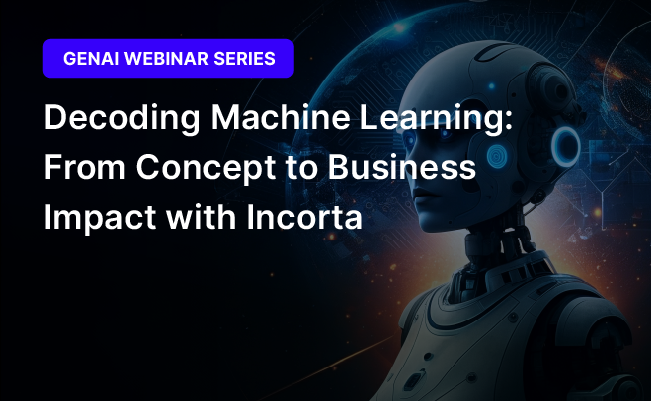
As a branch of AI, machine learning (ML) utilizes algorithms and statistical models to perform specific tasks without explicit programming instructions. This allows machines to learn from data, identify patterns, and make predictions. In our latest webinar, we explored machine learning concepts, fundamental principles, and real-world use cases – illustrating how customers have leveraged machine learning with Incorta to drive significant business outcomes.
What is Machine Learning?
Machine learning is different from traditional programming, as it enables computers to learn from data and make decisions or predictions without being explicitly programmed. Traditional programming involves a set of instructions executed to achieve a specific outcome – like calculating the square root of a number, or the break-even point in economics. In contrast, machine learning can predict customer behavior and recognize objects in an image.
Understanding machine learning begins with its fundamental concepts:
- Algorithms: Machine learning algorithms are mathematical models that analyze data, identify patterns, and make decisions. Common types include supervised learning, unsupervised learning, and reinforcement learning.
- Training Data: The quality and quantity of training data significantly impact a machine learning model’s performance. More diverse and representative datasets lead to better, more robust models.
- Features: Features are the measurable properties or characteristics the model uses to make predictions. Selecting the right features is crucial for building practical machine-learning applications.
- Model Evaluation: Once a model is trained, it must be evaluated to determine its accuracy and reliability. This process typically involves using separate test data to ensure the model generalizes well to unseen data.
However, not every customer use case can be solved with ML. In some cases, an ML implementation may not be the best solution and can even cause more complications than it seeks to solve.
The Importance of a Well-Fit Model
Underfitting or overfitting a model can be detrimental to the results generated by ML. Underfitting happens when a machine learning model oversimplifies the data and fails to capture enough information about the relationships within it. Overfitting, on the other hand, happens when the model is overly sensitive to the data, leading to an over-analysis of the patterns. The best machine learning method should be interpretable, simple, accurate, fast, and scalable.
Incorta: Transforming Machine Learning
Incorta’s ML lifecycle complements traditional data pipelines by providing a complete solution for data preparation, feature engineering, model training, prediction, monitoring, and model deployment.
Incorta offers features like Data Studio that simplify data preparation by low-technical users and ML professionals. It also provides access to large language models trained by industry-leading companies – requiring no setup, as these models are fully hosted and managed by Incorta.
The Incorta Machine Learning Life Cycle involves several key stages:
- Data Collection: Raw data from various sources is integrated into the Incorta platform without extensive ETL (Extract, Transform, Load) processes, creating a digital twin of the data.
- Data Preparation: Exploratory data analysis is conducted to understand the dataset and identify the necessary features for modeling.
- Feature Engineering: New features are created from existing data to enhance model performance. For example, calculating the total paid invoices per customer can provide valuable insights into payment behavior.
- Model Training: Multiple models are trained iteratively, allowing for performance validation and selecting the best-performing model.
- Deployment and Monitoring: The chosen model is deployed for predictions and monitored continuously to assess performance and make necessary adjustments.
Incorta MLOps
Incorta’s ML model registry is a central repository for storing, managing, and tracking the lifecycle of machine learning models. It allows for easy storage, import, version tracking, and model deployment, enhancing ML operations’ performance.
While machine learning may seem intricate and complex, platforms like Incorta make it more accessible and beneficial to businesses across various sectors.
Watch the full discussion here to learn more, and stay tuned for more in our GenAI webinar series.